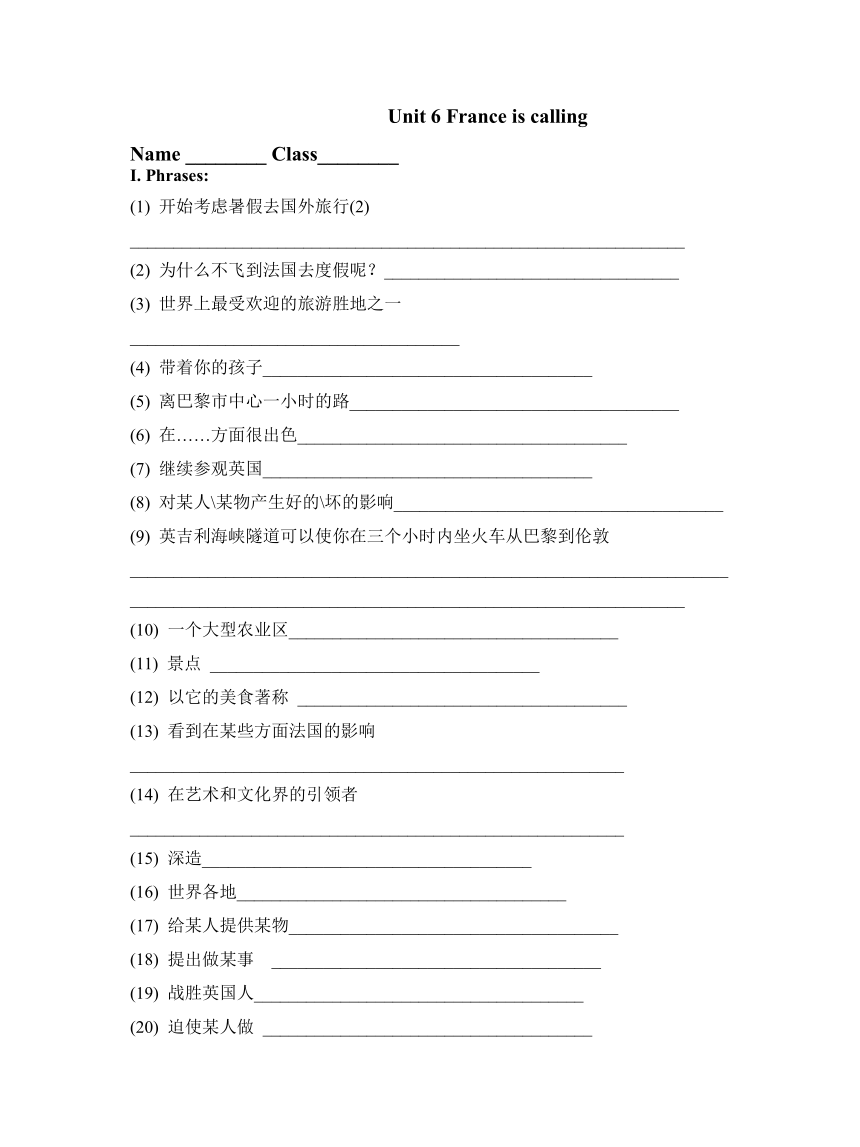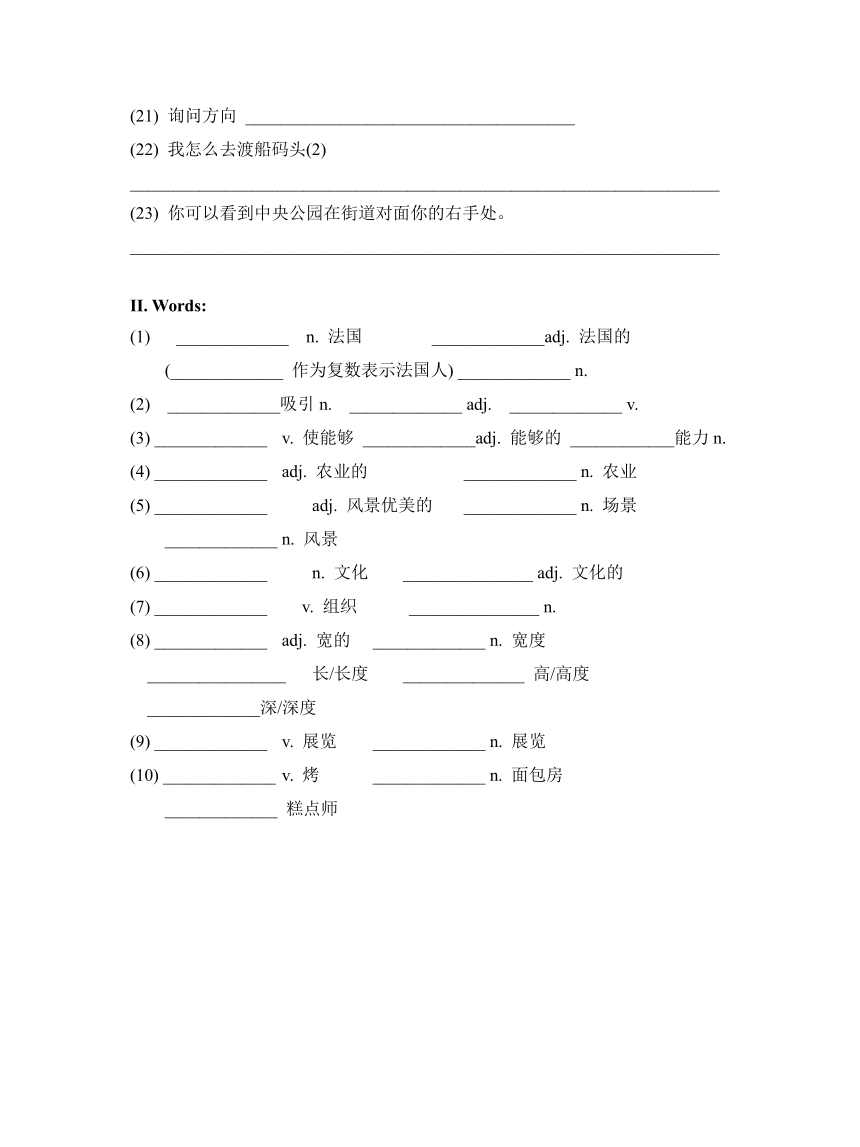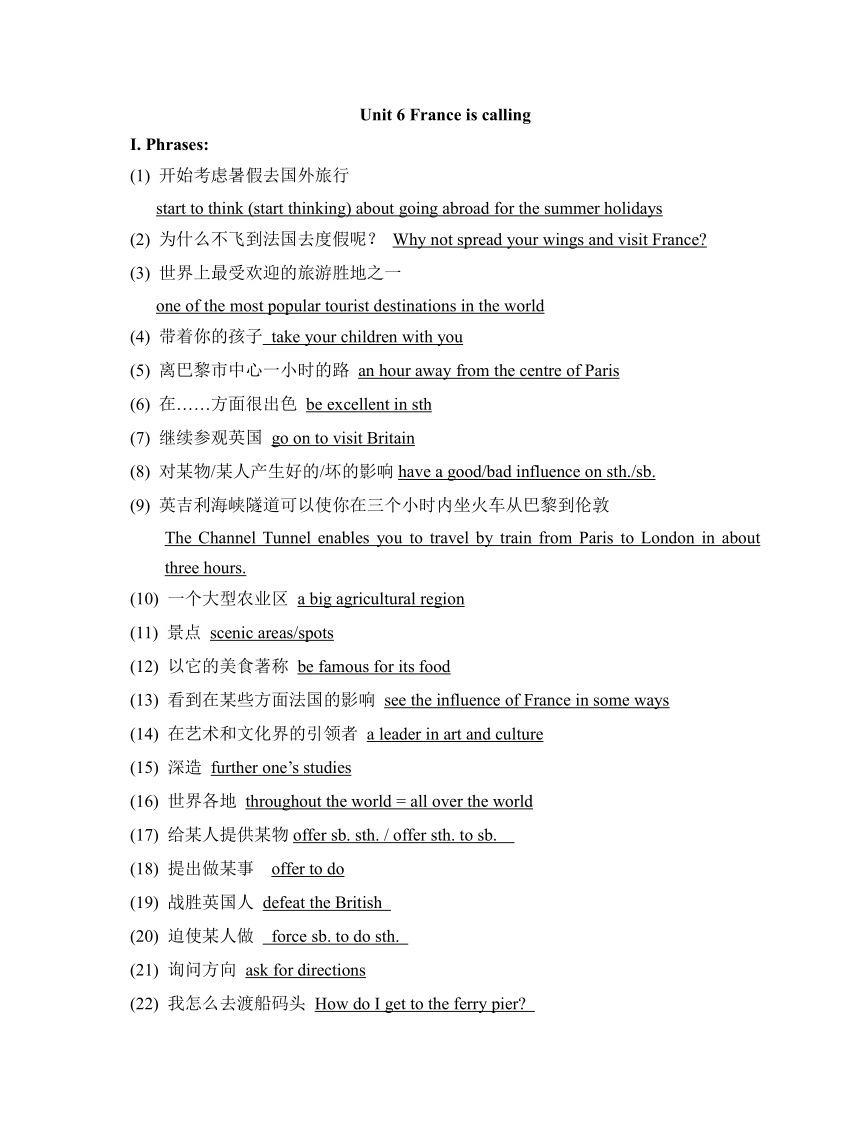Unit 6 Travel 默写卷2022-2023学年牛津上海版八年级英语下册(含答案)
文档属性
| 名称 | Unit 6 Travel 默写卷2022-2023学年牛津上海版八年级英语下册(含答案) |

|
|
| 格式 | docx | ||
| 文件大小 | 19.6KB | ||
| 资源类型 | 教案 | ||
| 版本资源 | 牛津上海版(试用本) | ||
| 科目 | 英语 | ||
| 更新时间 | 2023-02-10 11:29:47 | ||
图片预览



文档简介
Unit 6 France is calling
Name ________ Class________
I. Phrases:
(1) 开始考虑暑假去国外旅行(2)
________________________________________________________________
(2) 为什么不飞到法国去度假呢?__________________________________
(3) 世界上最受欢迎的旅游胜地之一______________________________________
(4) 带着你的孩子______________________________________
(5) 离巴黎市中心一小时的路______________________________________
(6) 在……方面很出色______________________________________
(7) 继续参观英国______________________________________
(8) 对某人\某物产生好的\坏的影响______________________________________
(9) 英吉利海峡隧道可以使你在三个小时内坐火车从巴黎到伦敦
_____________________________________________________________________________________________________________________________________
(10) 一个大型农业区______________________________________
(11) 景点 ______________________________________
(12) 以它的美食著称 ______________________________________
(13) 看到在某些方面法国的影响_________________________________________________________
(14) 在艺术和文化界的引领者_________________________________________________________
(15) 深造______________________________________
(16) 世界各地______________________________________
(17) 给某人提供某物______________________________________
(18) 提出做某事 ______________________________________
(19) 战胜英国人______________________________________
(20) 迫使某人做 ______________________________________
(21) 询问方向 ______________________________________
(22) 我怎么去渡船码头(2) ____________________________________________________________________
(23) 你可以看到中央公园在街道对面你的右手处。
____________________________________________________________________
II. Words:
(1) _____________ n. 法国 _____________adj. 法国的
(_____________ 作为复数表示法国人) _____________ n.
(2) _____________吸引n. _____________ adj. _____________ v.
(3) _____________ v. 使能够 _____________adj. 能够的 ____________能力n.
(4) _____________ adj. 农业的 _____________ n. 农业
(5) _____________ adj. 风景优美的 _____________ n. 场景 _____________ n. 风景
(6) _____________ n. 文化 _______________ adj. 文化的
(7) _____________ v. 组织 _______________ n.
(8) _____________ adj. 宽的 _____________ n. 宽度
________________ 长/长度 ______________ 高/高度
_____________深/深度
(9) _____________ v. 展览 _____________ n. 展览
(10) _____________ v. 烤 _____________ n. 面包房
_____________ 糕点师
Unit 6 France is calling
I. Phrases:
(1) 开始考虑暑假去国外旅行
start to think (start thinking) about going abroad for the summer holidays
(2) 为什么不飞到法国去度假呢? Why not spread your wings and visit France
(3) 世界上最受欢迎的旅游胜地之一
one of the most popular tourist destinations in the world
(4) 带着你的孩子 take your children with you
(5) 离巴黎市中心一小时的路 an hour away from the centre of Paris
(6) 在……方面很出色 be excellent in sth
(7) 继续参观英国 go on to visit Britain
(8) 对某物/某人产生好的/坏的影响have a good/bad influence on sth./sb.
(9) 英吉利海峡隧道可以使你在三个小时内坐火车从巴黎到伦敦
The Channel Tunnel enables you to travel by train from Paris to London in about three hours.
(10) 一个大型农业区 a big agricultural region
(11) 景点 scenic areas/spots
(12) 以它的美食著称 be famous for its food
(13) 看到在某些方面法国的影响 see the influence of France in some ways
(14) 在艺术和文化界的引领者 a leader in art and culture
(15) 深造 further one’s studies
(16) 世界各地 throughout the world = all over the world
(17) 给某人提供某物offer sb. sth. / offer sth. to sb.
(18) 提出做某事 offer to do
(19) 战胜英国人 defeat the British
(20) 迫使某人做 force sb. to do sth.
(21) 询问方向 ask for directions
(22) 我怎么去渡船码头 How do I get to the ferry pier
Can you tell me the way to the ferry pier
(23) 你可以看到中央公园在街道对面你的右手处。
You’ll see the Central Park across the street on your right.
II. Words:
(1) France n. 法国 French adj. 法国的(the French 作为复数表示法国人) Frenchman n.
(2) attraction un. 吸引力 (表示吸引人的事物时为可数)attractive adj. attract v.
(3) enable v. 使能够 able adj. 能够的 ability n.
(4) agricultural adj. 农业的 agriculture n. 农业
(5) scenic adj. 风景优美的 scene n. 场景 scenery n. 风景
(6) culture n. 文化 cultural adj. 文化的
(7) organize v. 组织 organization n.
(8) wide adj. 宽的 width n. 宽度
long length 长/长度 high height 高/高度 deep depth深/深度
(9) exhibit v. 展览 exhibition n. 展览
(10) bake v. 烤 bakery n. 面包房 baker 糕点师
III. Grammar:
1. used to do \ be used to doing \ be used to do 区别
used to do 过去常常(表示现在不再)
e.g. I used to swim in the lake near my village when I was young.
be used to doing习惯于做某事
e.g. My grandpa is used to going for a walk after dinner.
sth. be used to do = sth. is used for doing 被用于…
e.g. Wood can be used to make paper.
2. be famous for 和 be famous as 区别
be famous for = be known for 因为…而出名
e.g. France is famous for its food and wine.
be famous as = be known as 作为…身份而出名
e.g. He is famous as a great inventor.
3. provide 和 offer 区别
provide sth. for sb. = provide sb. with sth.
e.g. Some bakeries provide French bread and cakes for people.
Parents provide children with food and clothes.
offer sth. to sb.= offer sb. sth.
e.g. It offers many of the same attractions as the Disney parks.
4. 表示建议的句型
Why not do… / Why don’t you do… /What about doing… /How about doing… / Shall we do…
5.定冠词的用法
1) 特指某(些)人或某(些)事物。
e.g. The gentleman in brown is Alan’s grandfather.
2) 用在说话双方都明了的人或事物前。
e.g. Would you please open the door It’s a bit hot.
3) 用在前文提到过的人或事物前。
e.g. His car struck a tree; you can still see the mark on the tree.
4) 在世界上独一无二的事物前。
e.g. the earth the sea the sky the equator 赤道 the stars
5) 在形容词最高级、序数词及only(形容词)前。
e.g. The Nile is the longest river in the world.
It’s the only way to solve this problem.
6) 在国名的全称和缩写前。
e.g. the People’s Republic of China (= the PRC)
the United States of America (= the USA)
the United Kingdom (= the UK)
7) 用在江、河、海洋、海峡、群岛、山等专有名词前。
e.g. the Yangtze River the Atlantic (Ocean) the South China Sea
the English Channel the Philippines the Alps 阿尔卑斯山系
8) 用在乐器前。
e.g. Mozart could play the piano perfectly when he was only six.
9) 用在一些表示方向、方位、时间、场所的固定词组中。
e.g. on the right/left in the east in the distance
10) 用在姓氏的复数形式前,表示全家人。
e.g. The Lis usually go to the same place for holiday every year.
At that time, the Smiths were making a tour in China.
11) 形容词前表示一类人:
The government is trying to help the poor.
零冠词:
1. 学科名前:
They study maths, Chinese, physics, chemistry and so on.
2. 日期、节日 (除festival 表示的节日以外)前:
October 1 is Chinese National Day.
Today is Saturday.
3. 不可数名词、物质名词及抽象名词前表示一类 (泛指):
People all over the world love peace.
4. 街道、广场名称前:
People’s Square Fifth Avenue Nanjing Road
5. 球类、棋类、牌类或游戏前:
A lot of people enjoy playing football/chess/ poker
6. 一日三餐前:
Who did you invite to dinner yesterday
What do you usually have for breakfast
7. 称呼、头衔、职务前:
Julia was elected monitor of her class.
8. 在 this, those, my, whose, next, last, some, any, every, each等词前:
We are going to have a barbecue this coming Saturday.
There is a book in my other hand.
固定词组:
in space at school in hospital at dawn / noon/ midnight have dinner
by bus in time in fact go to church on show
Name ________ Class________
I. Phrases:
(1) 开始考虑暑假去国外旅行(2)
________________________________________________________________
(2) 为什么不飞到法国去度假呢?__________________________________
(3) 世界上最受欢迎的旅游胜地之一______________________________________
(4) 带着你的孩子______________________________________
(5) 离巴黎市中心一小时的路______________________________________
(6) 在……方面很出色______________________________________
(7) 继续参观英国______________________________________
(8) 对某人\某物产生好的\坏的影响______________________________________
(9) 英吉利海峡隧道可以使你在三个小时内坐火车从巴黎到伦敦
_____________________________________________________________________________________________________________________________________
(10) 一个大型农业区______________________________________
(11) 景点 ______________________________________
(12) 以它的美食著称 ______________________________________
(13) 看到在某些方面法国的影响_________________________________________________________
(14) 在艺术和文化界的引领者_________________________________________________________
(15) 深造______________________________________
(16) 世界各地______________________________________
(17) 给某人提供某物______________________________________
(18) 提出做某事 ______________________________________
(19) 战胜英国人______________________________________
(20) 迫使某人做 ______________________________________
(21) 询问方向 ______________________________________
(22) 我怎么去渡船码头(2) ____________________________________________________________________
(23) 你可以看到中央公园在街道对面你的右手处。
____________________________________________________________________
II. Words:
(1) _____________ n. 法国 _____________adj. 法国的
(_____________ 作为复数表示法国人) _____________ n.
(2) _____________吸引n. _____________ adj. _____________ v.
(3) _____________ v. 使能够 _____________adj. 能够的 ____________能力n.
(4) _____________ adj. 农业的 _____________ n. 农业
(5) _____________ adj. 风景优美的 _____________ n. 场景 _____________ n. 风景
(6) _____________ n. 文化 _______________ adj. 文化的
(7) _____________ v. 组织 _______________ n.
(8) _____________ adj. 宽的 _____________ n. 宽度
________________ 长/长度 ______________ 高/高度
_____________深/深度
(9) _____________ v. 展览 _____________ n. 展览
(10) _____________ v. 烤 _____________ n. 面包房
_____________ 糕点师
Unit 6 France is calling
I. Phrases:
(1) 开始考虑暑假去国外旅行
start to think (start thinking) about going abroad for the summer holidays
(2) 为什么不飞到法国去度假呢? Why not spread your wings and visit France
(3) 世界上最受欢迎的旅游胜地之一
one of the most popular tourist destinations in the world
(4) 带着你的孩子 take your children with you
(5) 离巴黎市中心一小时的路 an hour away from the centre of Paris
(6) 在……方面很出色 be excellent in sth
(7) 继续参观英国 go on to visit Britain
(8) 对某物/某人产生好的/坏的影响have a good/bad influence on sth./sb.
(9) 英吉利海峡隧道可以使你在三个小时内坐火车从巴黎到伦敦
The Channel Tunnel enables you to travel by train from Paris to London in about three hours.
(10) 一个大型农业区 a big agricultural region
(11) 景点 scenic areas/spots
(12) 以它的美食著称 be famous for its food
(13) 看到在某些方面法国的影响 see the influence of France in some ways
(14) 在艺术和文化界的引领者 a leader in art and culture
(15) 深造 further one’s studies
(16) 世界各地 throughout the world = all over the world
(17) 给某人提供某物offer sb. sth. / offer sth. to sb.
(18) 提出做某事 offer to do
(19) 战胜英国人 defeat the British
(20) 迫使某人做 force sb. to do sth.
(21) 询问方向 ask for directions
(22) 我怎么去渡船码头 How do I get to the ferry pier
Can you tell me the way to the ferry pier
(23) 你可以看到中央公园在街道对面你的右手处。
You’ll see the Central Park across the street on your right.
II. Words:
(1) France n. 法国 French adj. 法国的(the French 作为复数表示法国人) Frenchman n.
(2) attraction un. 吸引力 (表示吸引人的事物时为可数)attractive adj. attract v.
(3) enable v. 使能够 able adj. 能够的 ability n.
(4) agricultural adj. 农业的 agriculture n. 农业
(5) scenic adj. 风景优美的 scene n. 场景 scenery n. 风景
(6) culture n. 文化 cultural adj. 文化的
(7) organize v. 组织 organization n.
(8) wide adj. 宽的 width n. 宽度
long length 长/长度 high height 高/高度 deep depth深/深度
(9) exhibit v. 展览 exhibition n. 展览
(10) bake v. 烤 bakery n. 面包房 baker 糕点师
III. Grammar:
1. used to do \ be used to doing \ be used to do 区别
used to do 过去常常(表示现在不再)
e.g. I used to swim in the lake near my village when I was young.
be used to doing习惯于做某事
e.g. My grandpa is used to going for a walk after dinner.
sth. be used to do = sth. is used for doing 被用于…
e.g. Wood can be used to make paper.
2. be famous for 和 be famous as 区别
be famous for = be known for 因为…而出名
e.g. France is famous for its food and wine.
be famous as = be known as 作为…身份而出名
e.g. He is famous as a great inventor.
3. provide 和 offer 区别
provide sth. for sb. = provide sb. with sth.
e.g. Some bakeries provide French bread and cakes for people.
Parents provide children with food and clothes.
offer sth. to sb.= offer sb. sth.
e.g. It offers many of the same attractions as the Disney parks.
4. 表示建议的句型
Why not do… / Why don’t you do… /What about doing… /How about doing… / Shall we do…
5.定冠词的用法
1) 特指某(些)人或某(些)事物。
e.g. The gentleman in brown is Alan’s grandfather.
2) 用在说话双方都明了的人或事物前。
e.g. Would you please open the door It’s a bit hot.
3) 用在前文提到过的人或事物前。
e.g. His car struck a tree; you can still see the mark on the tree.
4) 在世界上独一无二的事物前。
e.g. the earth the sea the sky the equator 赤道 the stars
5) 在形容词最高级、序数词及only(形容词)前。
e.g. The Nile is the longest river in the world.
It’s the only way to solve this problem.
6) 在国名的全称和缩写前。
e.g. the People’s Republic of China (= the PRC)
the United States of America (= the USA)
the United Kingdom (= the UK)
7) 用在江、河、海洋、海峡、群岛、山等专有名词前。
e.g. the Yangtze River the Atlantic (Ocean) the South China Sea
the English Channel the Philippines the Alps 阿尔卑斯山系
8) 用在乐器前。
e.g. Mozart could play the piano perfectly when he was only six.
9) 用在一些表示方向、方位、时间、场所的固定词组中。
e.g. on the right/left in the east in the distance
10) 用在姓氏的复数形式前,表示全家人。
e.g. The Lis usually go to the same place for holiday every year.
At that time, the Smiths were making a tour in China.
11) 形容词前表示一类人:
The government is trying to help the poor.
零冠词:
1. 学科名前:
They study maths, Chinese, physics, chemistry and so on.
2. 日期、节日 (除festival 表示的节日以外)前:
October 1 is Chinese National Day.
Today is Saturday.
3. 不可数名词、物质名词及抽象名词前表示一类 (泛指):
People all over the world love peace.
4. 街道、广场名称前:
People’s Square Fifth Avenue Nanjing Road
5. 球类、棋类、牌类或游戏前:
A lot of people enjoy playing football/chess/ poker
6. 一日三餐前:
Who did you invite to dinner yesterday
What do you usually have for breakfast
7. 称呼、头衔、职务前:
Julia was elected monitor of her class.
8. 在 this, those, my, whose, next, last, some, any, every, each等词前:
We are going to have a barbecue this coming Saturday.
There is a book in my other hand.
固定词组:
in space at school in hospital at dawn / noon/ midnight have dinner
by bus in time in fact go to church on show
